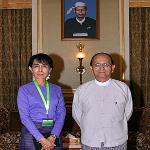Burma's normally defiant authorities have in recent weeks been welcoming their domestic and international critics for candid discussions. They have also slightly loosened their iron-clad grip on the media, leading observers to speculate on whether authorities could be softening their hard-line position. Analysts and rights activists have welcomed the moves but have dismissed suggestions that it represents any substantive change.
The United States special envoy for Burma, Derek Mitchell, is in the country this week meeting with representatives of the military-dominated government, the political opposition and activists.
Mitchell's visit is his first as U.S. special envoy and the latest in a series of meetings between authorities in Burma and their critics.
In August, Burma allowed the visit of United Nations special rapporteur on human rights in Burma, Tomas Ojea Quintana.
He has been spear-heading calls for a U.N. commission of inquiry for possible crimes against humanity and was previously denied requests to visit.
Burmese President Thein Sein also met with pro-democracy leader Aung San Suu Kyi, who spent almost two decades under house arrest for challenging military rule and was just released last year.
Both leaders described the talks as friendly.
Will Thein Sein be a reformer?
Carl Thayer is a professor of politics at Australia's University of New South Wales. He says the diplomatic moves by Thein Sein's government have raised hopes that he might become a historic reformer like South Africa's apartheid-era president, Frederik Willem de Klerk.
"It shows the president in a new light. People are debating whether he's a puppet of Than Shwe, the military man behind the scenes, or whether he's the F.W. de Klerk who is going to usher in a new period. I think we shouldn't be too premature in seeing 'the opening' occurring but we can see positive trends and then speculate as to the reasons for them,"
In recent weeks, President Thein Sein called for peace talks with rebel groups, invited political exiles who fled persecution to return home, and set up the government's first human rights commission.
Journalists were for the first time invited to observe legislative debates.
Burma's strict censors also allowed some positive media reports about Aung San Suu Kyi and toned-down regular propaganda condemning the BBC, VOA and other western media.
Are changes real?
However, political analysts and rights activists point out military leaders have taken similar actions in the past only to reverse course when it suits their purpose.
At least one dissident journalist who took Thein Sein's offer and returned to the country was immediately detained and questioned at the airport.
And authorities punished a local journal that published Aung San Suu Kyi's first interview in years with a domestic publication.
Benjamin Zawacki, a Burma researcher for Amnesty International, says any hints of reform in Burma should be greeted with skepticism.
"And so, we've seen this before, perhaps as a concession on the part of the government, perhaps as a means of deflecting international criticism. But, it has not ever translated into real progress on the ground in human rights," said Zawacki. "And, I think the real measure of whether or not these moves on the part of the government are real or simply strategic or simply window dressing will be determined by actual events on the ground."
Zawacki notes more than 2,000 political prisoners remain behind bars in Burma despite ongoing international pressure.
'Polishing international image'
He says authorities are polishing their international image in hopes of getting western economic sanctions lifted.
Burma also wants to chair the Association of Southeast Asian Nations in 2014. It was previously pressured out of its turn in the prestigious role so as not to embarrass the regional group.
Burma has for decades been dominated by the military and its fight against ethnic rebels seeking autonomy. The result has been tight controls on society and one of the world's worst human rights records.
'Military still in control'
Bertil Lintner, a Thailand-based author on politics in Burma, says the military is still firmly in control. He say only internal disobedience will bring about real political change. Lintner points out that dissent within the ranks was crucial for bringing down former military governments in South Korea, the Philippines, and Indonesia.
"And I cannot see Burma changing in any other way," he said. "As long as the military remains united, and they are very united, there won't be any fundamental changes of the present power structure in the country. And, certainly, no steps toward real democracy."
Elections in 2010 brought Thein Sein to power but were widely condemned as a sham designed to cement harsh military rule in the guise of democracy.
Even before the vote, the military-drafted constitution gave it a quarter of all seats in parliament. And the polls were marred by fraud and intimidation.
The main opposition, Aung San Suu Kyi's National League for Democracy, boycotted the election because of unfair rules that banned her from running for office.
The NLD won Burma's previous election in 1990 by a landslide but the military refused to give up power.
